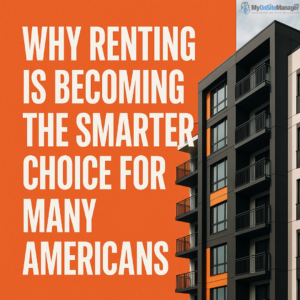For decades, owning a home has been the hallmark of the American Dream something to strive toward as a sign of stability, success, and financial security. But new research from Bankrate, as reported by The Hill, suggests that this long-held belief is rapidly changing. In today’s housing market, renting has become not only a practical alternative to buying but, in many cases, a more financially sound one.
Renting Is Cheaper in Nearly Every Major Metro Area
Bankrate’s analysis found that renting is now more affordable than owning in nearly all major metropolitan areas across the United States. With mortgage rates still relatively high and home prices surging, many prospective buyers especially first-timers are finding it difficult to break into the housing market. The monthly cost of owning a median-priced home, including principal, interest, taxes, and insurance, far exceeds the average monthly rent in most cities.
For example, in cities like San Francisco, Los Angeles, and Seattle, the gap between renting and buying can amount to thousands of dollars a year. Even in more moderately priced markets, renting often comes out ahead when you factor in all the costs associated with ownership.
Financial Flexibility and Stability
One of the most significant advantages of renting is predictability. Renters typically have a clear understanding of their monthly housing expenses, with fewer surprise costs. Homeowners, on the other hand, must budget for unpredictable expenses like repairs, property taxes, HOA fees, and maintenance.
This stability can be particularly attractive to younger renters, many of whom are still establishing their careers or paying off student loans. Renting gives them the financial flexibility to save for the future, invest in other assets, or simply avoid overextending themselves in a volatile housing market.
A Shift in Mindset Among Younger Generations
Perhaps one of the most telling insights from the study is the generational shift in attitudes toward homeownership. Millennials and Gen Z are rethinking traditional paths and values—including the necessity of buying a home.
To them, renting doesn’t represent failure or transience. Instead, it reflects a conscious decision to prioritize mobility, experiences, and financial prudence. In a world where remote work, gig economies, and life transitions are the norm, the ability to pack up and move without being tied down by a mortgage is a valuable asset.
Renting Offers Lifestyle Perks
Beyond finances, renting offers lifestyle advantages that ownership can’t always match. Many rental properties are located in prime urban neighborhoods where purchasing a home may be out of reach. Renters often enjoy access to amenities such as fitness centers, pools, concierge services, and proximity to work, restaurants, and cultural hubs.
For those who value convenience, freedom from maintenance responsibilities, and the ability to easily relocate, renting aligns well with their lifestyle goals.
Homeownership Still Has Value But Timing Matters
Of course, this doesn’t mean that homeownership is obsolete. Buying a home can still be a worthwhile investment especially in the long term. But the study underscores a growing understanding that homeownership isn’t always the right move for everyone at every stage of life.
For many, the decision to wait until they’re financially ready or to opt out of buying altogether is proving to be the smarter, more sustainable choice.
Final Thoughts
The idea that renting is “throwing money away” is being challenged by today’s economic realities. As housing prices and mortgage rates remain elevated, and lifestyle preferences continue to evolve, renting is no longer just a stepping stone—it’s a legitimate and often financially advantageous way to live.
The takeaway? Whether you’re a recent graduate, a young professional, or someone reevaluating your long-term housing plans, renting might just be the smarter, more strategic choice for your situation today.
Source: The Hill – Renting beats buying in nearly every major US metro: study

